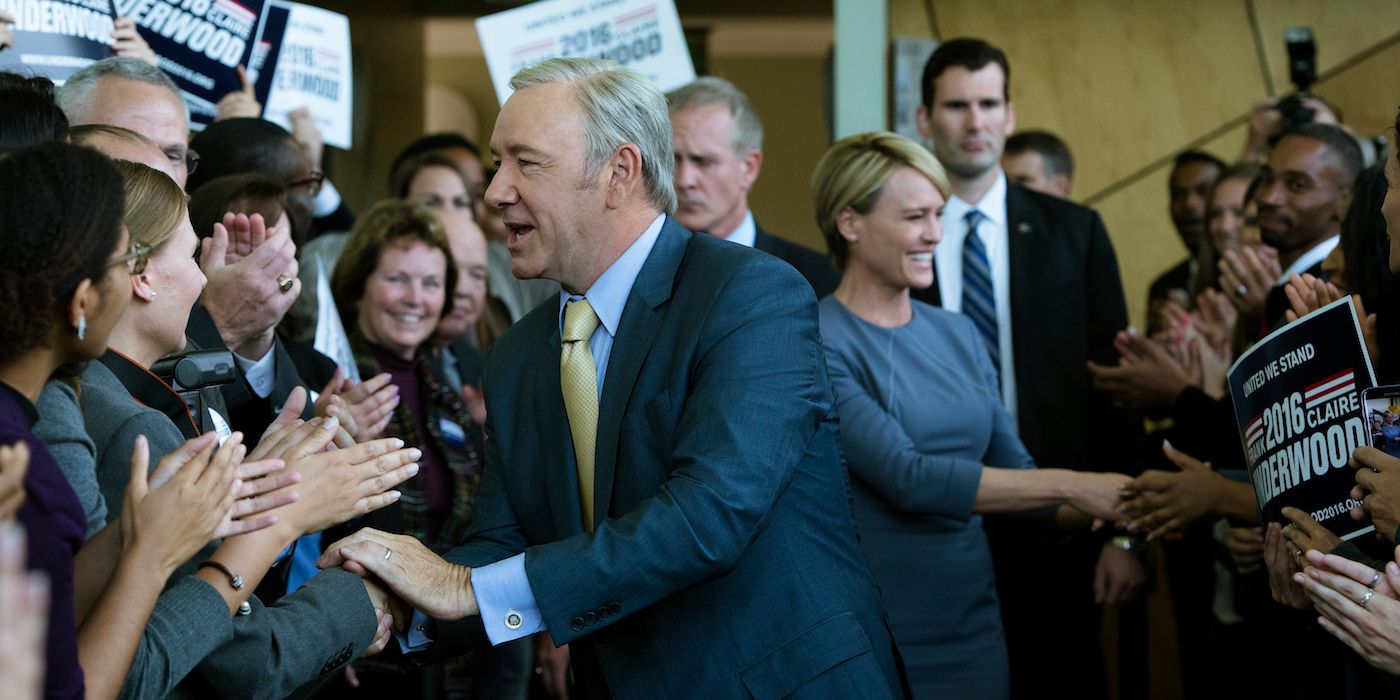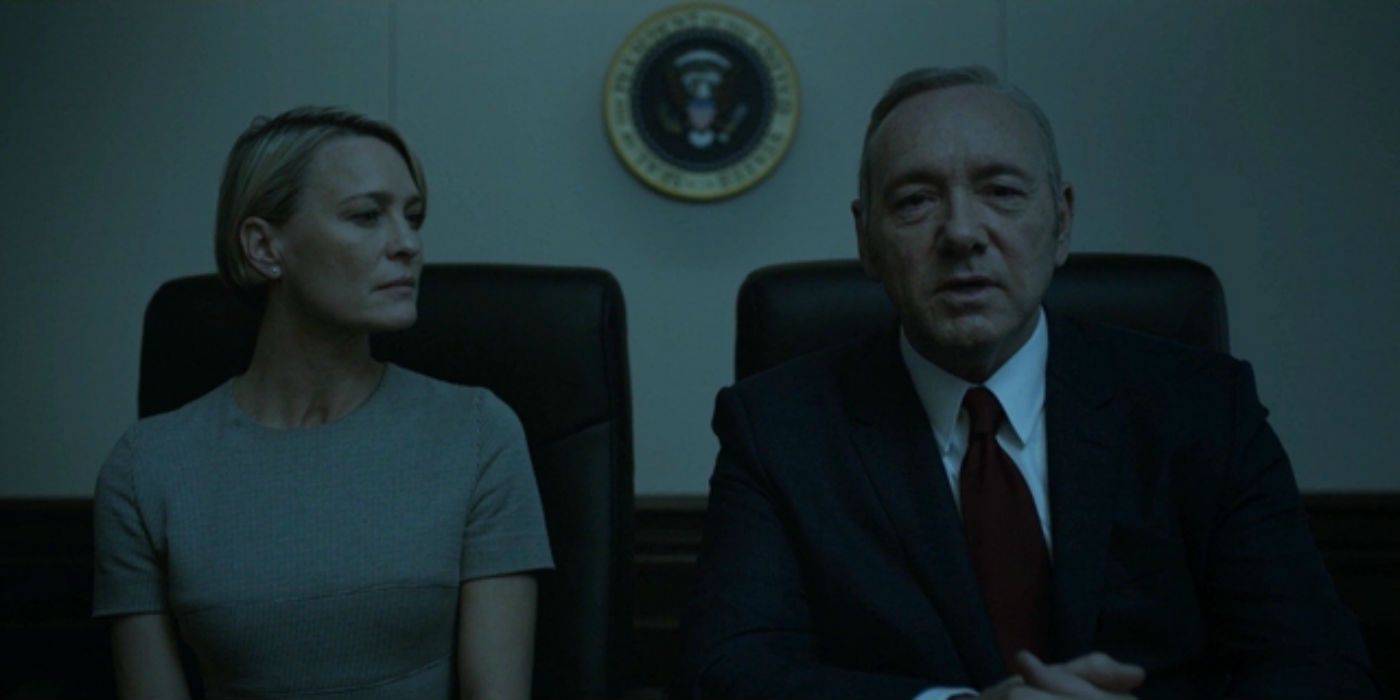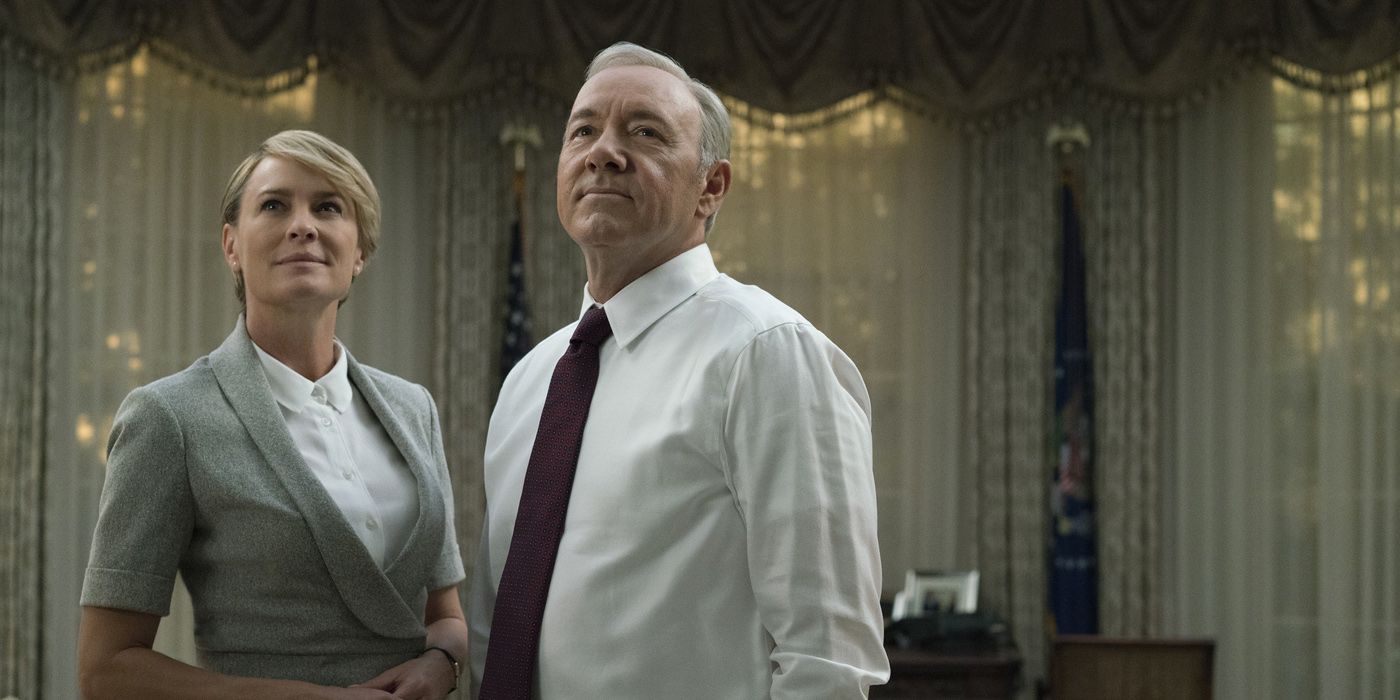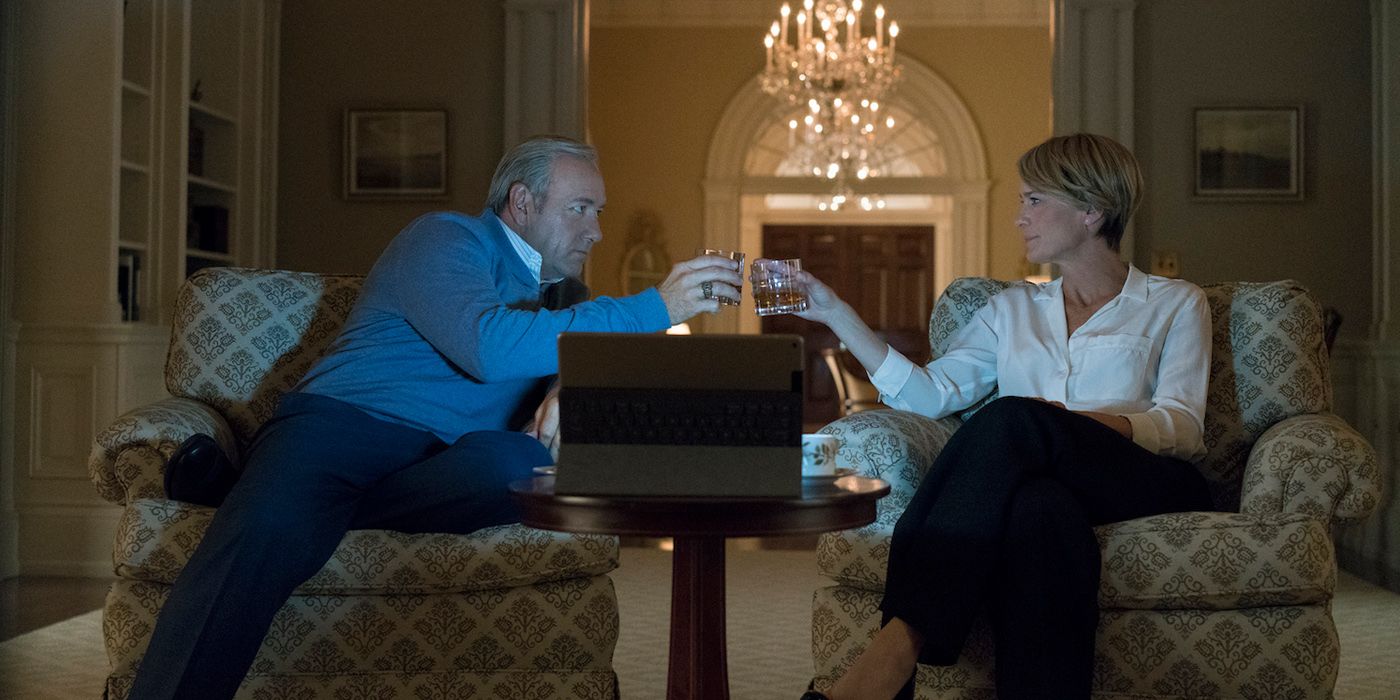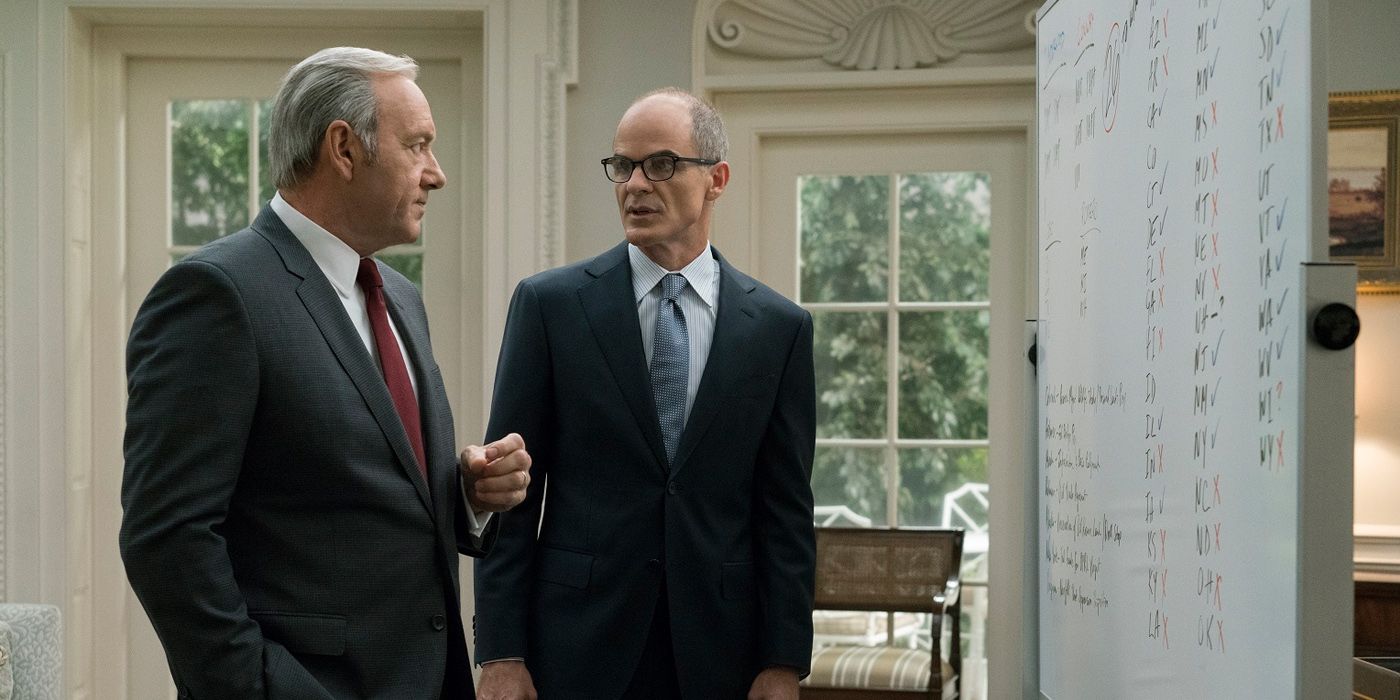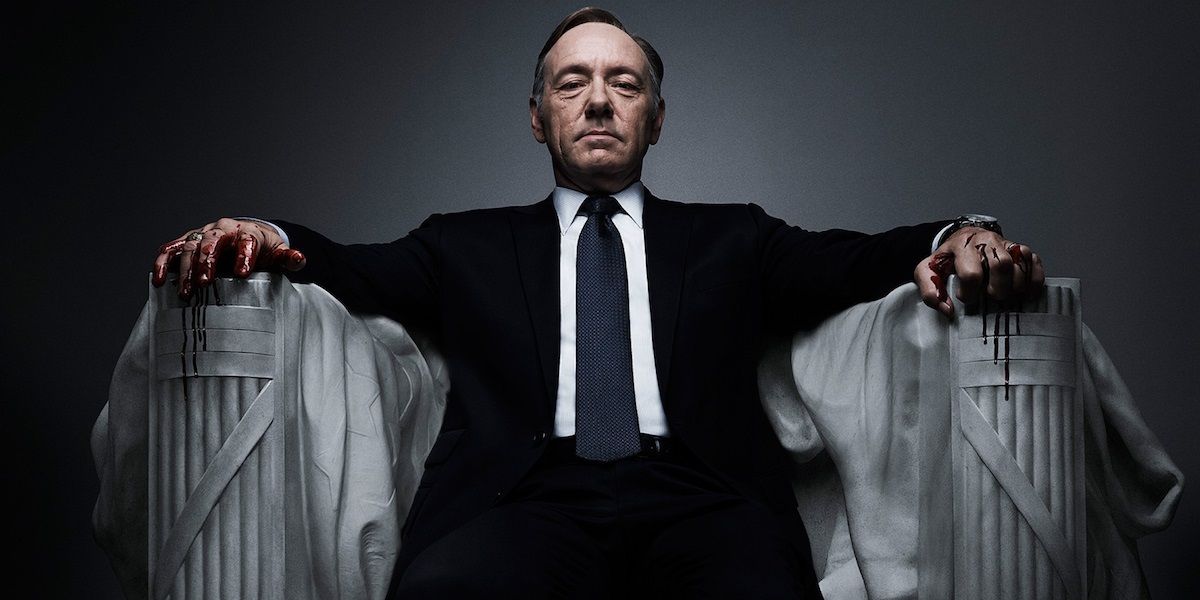If there's one thing that House of Cards fans should have become accustomed over the past five years, it's that Frank Underwood's schemes typically stretch for entire seasons and take form in the most unexpected ways. In Season 5, however, he outdoes himself. The new thirteen-episode run is mostly concerned with the 2016 Election and its incredibly protracted fallout, leaning heavily on both the unique political landscape that Netflix has built up over the past four years and a strong understanding of the American constitution.
Needless to say, the conflict between the Underwoods and Will Conway gets pretty complicated, with the show requiring a high level of knowledge and presenting itself in a purposefully devious way; this isn't an election with a simple winner and loser. To help you get the most out of the new season, here's an explainer of what Frank's up to throughout the run.
It's admittedly tricky to discuss individual episodes without addressing the full season, but to make it easier we've broken the explanation into three sections that cover the specific schemes of a few episodes each. If you've seen the required episodes, you can read these sections without fear of future spoilers.
- The Original Plan (Episodes 1-3) (This Page)
- [valnet-url-page page=2 paginated=0 text='The%20Election%20Day%20And%20Fallout'] (Episodes 4-9)
- [valnet-url-page page=3 paginated=0 text='Frank%27s%20Masterplan'] (Episodes 10-13)
What Has Frank Already Done Before Season 5?
Most of the run-up to the election was already seen in Season 4, including the Primaries and the increasingly prominent threat of ISIS parallel ICO. There are two key elements from this that are particularly important to what goes down in Season 5.
The first is how the Underwood campaign has used illicit means to target voters; this had already been a hot topic with Conway allegedly using Pollyhop, a search engine created by a school friend, to gather personal information, yet the Democrats still brought in Aidan Macallan, a childhood friend of LeeAnn Harvey and worker at the NSA. He used illegal means to provide the campaign with information on the gun lobby and later launched an algorithm to measure reactions during the debates.
The second is the decision to steer into terror. While Frank's method of getting Claire as a running mate was far from orthodox, the pair had conducted the campaign normally up until Season 4's finale; however, when the threat of ICO became clear they chose to instead start using the terror as a motivator.
The Original Plan - How Frank Intends To Suppress Voters
In Episodes 1-3, we see Frank and Claire turn up the heat. Frank calls for an investigative war committee to validate his fearmongering and serve as a backdrop for his attempts to suppress the voters; allegedly in response to the ICO threat, he proposes the idea of voting hubs in major metropolitan areas manned by military rather than plentiful smaller polling stations. He picks conventional swing states where there's a strong Republican base and aims to structure it so districts with Democrat presence are favored, stacking the odds in his favor
While Governers of the specific states aren't the biggest fans, Underwood manages to convince most of them by having Doug get their Chief of Staffs onboard and forcing Macallan to create the illusion of a terrorist cyber attack.
Next Page: [valnet-url-page page=2 paginated=0 text='The%20Election%20Day%20And%20Fallout']
Election Day - How Frank Suspends The Election
It becomes apparent on election day that the Underwood's plan isn't going to work; voter turnout is 30% lower than expected and all polls point towards the outcome swinging to Conway. Realizing that they can't win the election fairly even with their light rigging, Frank and Claire decide to hang it instead. Per the Constitution, to win an election a candidate needs to get 270 of the 538 electoral college votes from across the 50 states. The only way for a winner to not be decided is for neither candidate to hit that total - i.e. not enough states declare their votes - which is what they set out to influence.
The Underwoods start by targeting Tennessee, which is the site of a potential ICO attack that Frank further manipulates to create a cloak of terror. Using reverse psychology on the state's Governor, he gets them to close the polls and impose a curfew across the state. However, Tennessee's 11 electoral college votes aren't enough to fully stop the election - but what this does is create a culture of fear.
The real focus is, instead, Ohio. This was one of the major targets of Frank's polling initiative previously and, carrying 18 votes, is enough to guarantee no clear winner. Doug takes the reigns here, again forcing Macallan to fabricate NSA data saying there's another threat imminent and strong-arming the Governor over how the military presence and voting hubs he agreed to will be viewed as voter suppression if he doesn't comply. Ohio closes polling early and as a result chooses to not declare, suspending the vote until further notice and with it the election.
In addition to this, the Underwoods have been working on getting states to file for voter intimidation to further the sense that this was an unfairly-ran election. This starts off methodically on their part, but as the day comes to a close other states are making claims organically, upping the level of confusion of what's actually going on to those on the outside.
To distance himself from all this, Frank openly concedes to Conway over the phone and announces defeat to his supporters just before the Ohio development, making him look oblivious to anything that was going on.
The Second Vote
What Frank's taking advantage of is a sub-clause in the 12th Amendment of the US Constitution; if the electoral college is unable to come to a decision, the matter of electing a President and Vice-President moves to the House of Representatives and the Senate respectively. For President, each state has a single vote - Representatives of each state coming to a shared, unanimous decision - whereas for Vice every Senator (two per state) gets a vote each. Voting system aside, the big difference to the normal election here is that the Presidential and Vice-Presidential candidates are separated from their ticket, with it possible to have a POTUS and VP from different parties in power. The explicit deadline on the Presidential process is March 4th, after which point the voted Vice-President becomes President.
This is how Frank thinks he has the best chance to win. While he's mixed as a President, he is evidently skilled at manipulation and rallying the House and Senate to his cause - hence why he was such a successful Whip in the first season. And, as the only case of this happening in the past is in 1825 with John Quincy Adams, there's little, if any, precedent for how to proceed here. Since he's still in office, this gives Frank a chance to further tip the scales; it's decided to hold the votes at the same time so one does not influence the other, which practically creates more deadlock. Indeed, thanks to his buttering up of various Representatives, Frank manages to come back from Conway being the likely victor to a 25-25 heat in the House, while Claire easily wins VP, making her the Acting President as the country waits for the second vote.
As that nears, however, it becomes uncertain which way the House will swing, making it a big gamble and risk having a split White House. With Republican support for Conway already waning (he was expected to be a lame duck while VP General Brockhart took real control) it's beneficial to both sides to try their luck with a revote. Frank is reluctant, but with Claire in the driver's seat, she makes the decision.
In the end, it works out. Having reduced the Presidential election down to one state - Ohio - Frank's already increased his odds and seals a victory when he's given leverage over both of the cracked enemies: Conway and Brockhart are beginning to wear, neither having the stamina for such a long fought battle, and accidentally get recorded saying dangerous things. It may be unconventional, but Frank Underwood has finally been elected as President and earned his mandate. But that's just part of it.
Next: [valnet-url-page page=3 paginated=0 text='Frank%27s%20True%20Masterplan']
Frank's True Masterplan - Moving Above The Presidency
For most of the Season 5, Frank's goal is just to secure the Presidency. However, after Claire calls for the Ohio and Tennessee revote he has a change of perspective. As part of his campaigning, Frank attends Elysian Fields, a secret society akin to the Freemasons formed of some of the richest and most powerful people in the country, including Pollyhop founder Ben Grant, Raymond Tusk, Mark Usher, and Brockhart. Typically, sitting Presidents are barred from attending, but due to Claire technically being in the acting position he (again on a loophole) is allowed. Here he intends to convince various industrialists to lend him his support but over the weekend begins to grasp how much true power the private sector really holds; Frank doesn't specify what tips him over, but the untapped opportunity evident from seeing that Tusk is more concerned with vain attempts at immortality than he is power and that Grant is able to accidentally influence the entire election with his acquired audio of Conway is sure to be at the heart of it.
From here-on-in, Frank's plan shifts; he no longer wants the Presidency, but instead strives to be the puppetmaster behind the office. Really, the whole victory is a mere formality (reflected in how the show skips the final part of the campaign) and everything that happens in the season post-election - the reinstatement of the declaration of war committee, Former President Walker testifying, and Durant turning state's evidence - is to set up his resignation and passing of the baton to Claire, who in his mind will clear him of all crimes. This is why he was so insistent on doing things that initially appear damaging - from talking to Walker to being desperate to go on the stand himself.
Perhaps the biggest surprise in this is that Frank has himself become a leak to Tom Hammerschmidt as the Washington Herald, revealing insider secrets to add press interest on the crumbling administration and justify monitoring of the entire White House and its staff, able to make sure everything is going to plan. He also uses the opportunity to underscore some of his more extreme misdeeds, feeding information about Zoe Barnes and implicating Doug as the killer, who is also set to be pardoned by Claire.
But while he's thought of every possibility, like the constitutional loopholes he took advantage of to get here, there's one eventuality not accounted for; while Frank is functioning on a higher sociopathic level than seemingly anyone else in Washington D.C. and able to connive his resignation and transition of power, he doesn't consider his wife's fury. In her first address, she was meant to declare war on Syria and exonerate her predecessor, but stops short before declaring "my turn."
The exact reason why Claire decides to not pardon him in her first address is left dangling for a very exciting Season 6, but it appears to be a mixture of her own power-hungry ambitions and resentment for Frank doing all of this without her knowledge. Nevertheless, she persisted.
All five seasons of House of Cards are available on Netflix now.

